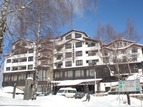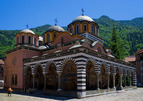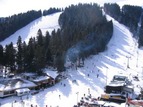What does 'Responsible tourism' mean? How to adopt good practices in Bulgaria?
Sofia Echo , 05.04.2010
*Bulgaria-hotels.com team slightly changed the original title of the article. However, the original article remains in its original state. In Bulgaria, there is a growing feeling among some in the hospitality industry and among holidaymakers of the need for "responsible tourism". For the past two years, a system has been in place to give meaning to those words and give an assurance that those claiming to offer it are selling more than just a feelgood phrase.
In Bulgaria, there is a growing feeling among some in the hospitality industry and among holidaymakers of the need for "responsible tourism". For the past two years, a system has been in place to give meaning to those words and give an assurance that those claiming to offer it are selling more than just a feelgood phrase.
Green Lodge is a certificate issued to guesthouses, small hotels and B and B’s that meet the criteria for the ECEAT (European Centre for Ecological and Agricultural Tourism) label and Eurogites (European Federation of Farm and Village Tourism) criteria for sustainable tourism. In an interview with The Sofia Echo, Kiril Kaloyanov, secretary of the Bulgarian Association for Alternative Tourism (BAAT), explains the meaning of responsible tourism. "It is responsibility, sustainability, in your approach when you are developing something; you need to have in your focus three dimensions – the cultural side, the nature side and the economic side." Responsible tourism means responsibility in all three of these dimensions, he says. There are customers who make their choices according to whether tourism is responsible, up to 20 per cent of the market. "We have examples where people who have our certificate have been told by their guests that they made their decision because they had applied for a certificate." The system originates from ECEAT and Eurogites. There are two levels of participation. Places are scored according to set criteria, and if they score above 60 per cent, they receive a full certificate, but if they fall short, they are classed as having received a nomination – and are given recommendations about how to get up to standard.
The criteria include that a place should support environmentally-friendly agriculture, use water and energy in an efficient and responsible way, use sustainable building and maintenance materials, have a waste reduction policy in place, encourage responsible means of transport, contribute actively to nature conservation, sustain the cultural heritage, contribute to the local economy, offer environmental information services to guests and continuously improve its environmental performance.
Each certificate – nomination and the fully-fledged certificate – is valid for three years. Those in charge of issuing the certificates stay alert to reports from certificate-holders and their guests, with the system providing for check-ups and recommendations as required. About 25 certificates have been issued since the project started in 2008, and the only occasions on which certificates have been withdrawn, two or three by Kaloyanov’s count, have been because of non-payment of the fee, none for lack of compliance with the criteria. The list is on BAAT’s website, Baatbg.org.
People are looking for quality, Kaloyanov says, and when considering a rural tourism holiday, the certificate is an assurance of quality. Word of mouth, of course – the personal recommendation – can be decisive, but such certificates can be a persuasive factor. A website is planned, he says, that will illustrate good and bad practices. Asked for examples of good and bad practices, Kaloyanov said that he had seen some that were "truly astonishing" in what they were achieving. In Veliko Turnovo, there were two examples, one a camping facility run by British people, the other a youth hostel. The campsite has state-of-the-art environmental technologies, including its water management system which ensures that all water consumed by guests is fully recycled. The project was put together after the couple spent a year travelling Europe and taking notes about good and bad examples that they had seen at various campsites. The couple had developed good contacts with local people who provide them with home-produced food and crafts. The hostel, apart from a stunning view over the Yantra River, also has developed strong ties with the local community, "so that, in this way, visitors can encounter the culture of Bulgaria in a more natural way".
 The third example was at Panagyurishte, where a family has a tavern set up in a restored house originally built more than 160 years ago. "They retained the atmosphere of the place, and with experience in tourism and the restaurant business, and their daughter is a landscape architect, and they have made use extensively of sustainable technologies."
These technologies include significant reliance on solar panels and on eco-friendly fuel, and thorough insulation of the building.
Another good example, Kaloyanov says, is that some hosts in places that do not have separated waste management gather their waste and, when trips to cities that do have such waste management come up, take it there – but do not make such trips specially, so as not to defeat the point of the exercise.
The third example was at Panagyurishte, where a family has a tavern set up in a restored house originally built more than 160 years ago. "They retained the atmosphere of the place, and with experience in tourism and the restaurant business, and their daughter is a landscape architect, and they have made use extensively of sustainable technologies."
These technologies include significant reliance on solar panels and on eco-friendly fuel, and thorough insulation of the building.
Another good example, Kaloyanov says, is that some hosts in places that do not have separated waste management gather their waste and, when trips to cities that do have such waste management come up, take it there – but do not make such trips specially, so as not to defeat the point of the exercise.
Bad examples, that run against the principle of responsible tourism, arise from the fact that it is very hard for places to meet the criteria for the bathrooms in water management, or from poor local roads – factors, Kaloyanov says, that are out of the control of the hosts and require action by local municipalities. Other shortcomings, he says, include hosts that do not provide sufficient local information or to take the initiative to explain to guests about their options, or fail to sufficiently support the local economy and agriculture. It should not be left up to guests to come up with questions about what they might be interested in doing, according to Kaloyanov. Another shortcoming is that some hosts do not do enough to encourage their guests to save water and energy. "It’s one of the aims of the trademark to address these weak sides and show the host that it’s really important, and that the tourists can help them save money." This is an important dynamic in such sustainable tourism. It may require a significant initial investment to go over to sustainable technologies, but in the long term, it pays off in savings; a principle that may be said to apply as a whole to responsible tourism.
See source hereBook your flight to Bulgaria at great prices
Eco friendly tourism and valuable hot offers for 'natural holiday'
 Member of:
Member of:



























 Touroperator
Touroperator
